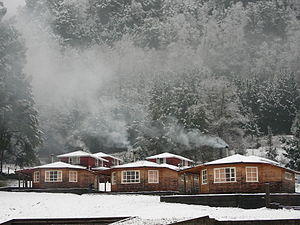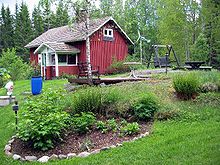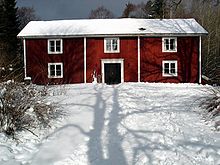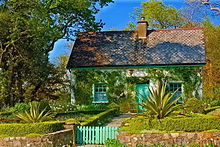- Cottage
-
Contents
In modern usage, a cottage is usually a modest, often cozy dwelling, typically in a rural or semi-rural location. However there are cottage-style dwellings in cities, and in places such as Canada the term exists with no connotations of size at all (cf. vicarage or hermitage). In the United Kingdom the term cottage also tends to denote rural dwellings of traditional build, although it can also be applied to dwellings of modern construction which are designed to resemble traditional ones ("mock cottages")
In certain places (e.g. Eastern Canada, Scandinavia and Russia) the term "cottage" (in Finnish mökki; in Estonian suvila; in Swedish stuga; in Norwegian hytte [from the German word Hütte], in Russian дача (dacha)) can refer to a vacation/summer home, often located near a body of water. However, in the USA generally this is more commonly called a "cabin", "chalet", or even "camp".
Origin of the term
Originally in the Middle Ages, cottages housed agricultural workers and their friends and families. The term cottage denoted the dwelling of a cotter. Thus, cottages were smaller peasant units (larger peasant units being called messuages). In that early period, a documentary reference to a cottage would most often mean, not a small stand-alone dwelling as today, but a complete farmhouse and yard (albeit a small one).
Thus, in the Middle Ages, the word cottage (MLat cotagium) denoted not just a dwelling, but included at least a dwelling (domus) and a barn (grangia), as well as, usually, a fenced yard or piece of land enclosed by a gate (portum). The word is probably a blend of Old English cot, cote "hut" and Old French cot "hut, cottage", from Old Norse kot "hut". Examples of this may be found in 15th century manor court rolls. The house of the cottage bore the Latin name: "domum dicti cotagii", while the barn of the cottage was termed "grangia dicti cotagii".
Later on, "cottage" might also have denoted a smallholding comprising houses, outbuildings, and supporting farmland or woods. A cottage, in this sense, would typically include just a few acres of tilled land. Regional examples of this type included the Welsh Tŷ unnos or House in a night, built by squatters on a plot of land defined by the throw of an axe from each corner of the property. Much later (from around the 18th century onwards), the development of industry led to the development of weavers' cottages and miners' cottages.
According to the Oxford English Dictionary, the term cottage is used in North America to represent 'a summer residence (often on a large and sumptuous scale) at a watering-place or a health or pleasure resort' with its first recognised use dating to 1882, in reference to Bar Harbor in Maine.
In Canada and the U.S.
In North America, most buildings known as cottages are used for weekend or summer getaways by city dwellers. It is also not uncommon for the owners of cottages to rent their properties to tourists as a source of revenue. In Saint John, U.S. Virgin Islands, most buildings known as cottages or vacation rentals are used for weekend or summer getaways. In Michigan, when one refers to a cottage it normally means a summer residence farther north near or on a lake.
"Cottages" in Eastern Canada are generally located next to lakes, rivers, or the ocean in forested areas. They are used as a place to spend holidays with friends and family; common activities including swimming, canoeing, waterskiing, fishing, hiking, and sailing. There are also many well-known summer colonies.
Cottage living is one of the most popular tourist draws in Ontario, Canada, parts of which have come to be known as cottage country. This term typically refers to the north and south shores of Georgian Bay, Ontario; Muskoka, Ontario; Haliburton, Ontario; and the Kawartha Lakes, Ontario; but has also been used to describe several other Canadian regions. The practice of renting cottages has become widespread in these regions, especially with rising property taxes for waterfront property.
What Eastern Canadians refer to as "cottages" (seasonal-use dwellings), are generally referred to as "cabins" in most of North America. This is most notable in the Midwest and Western United States, and Western Canada. In much of Northern Ontario, New England, and upstate New York a summer house near a body of water is known as a camp.[citation needed]
In Finland
Statistics Finland defines a cottage (in Finnish: mökki, in Swedish stuga or villa) as "a residential building that is used as a holiday or free-time dwelling and is permanently constructed or erected on its site".[citation needed] Finnish cottages are traditionally built of logs but other wood constructions have become common. They are usually situated close to water and almost all have a sauna.
There are 474,277 cottages in Finland (2005), a country with 187,888 lakes and 179,584 islands, including rental holiday cottages owned by hospitality companies but excluding holiday villages and buildings on garden allotments. Reports have 4,172 new cottages built in 2005.[citation needed] Most cottages are situated in the municipalities of Kuusamo (6,196 cottages on January 1, 2006), Kuopio (5,194), Ekenäs (Tammisaari - 5,053), Mikkeli (4,649), and Mäntyharju (4,630).[citation needed]
In Sweden
The formal Swedish term for cottages is fritidshus (vacation house) or stuga, of which there are 680.000 in Sweden (2007). According to Statistics Sweden, about 50% of the Swedish population has access to a vacation house.[1] In everyday talk, Swedes refer to their cottages as lantstället (the country house) or stugan (the cottage). Most vacation houses in Sweden are to be found along the coasts and around the major cities. Prices vary a lot depending on location; a modern seaside house near Stockholm may cost 100 times as much as a simple cottage in the inner regions of northern Sweden.
Until the end of World War II, only a small wealthy elite could afford vacation houses - often both a large seaside house and a hunting cabin up north. During the rapid urbanisation in the 1950s and 60's, many families were able to retain their old farmhouses, village cottages and fisherman cabins and convert them into vacation houses. In addition, economic growth made it possible even for low income-families to buy small lots in the countryside where they could erect simple houses. Former vacation houses near the large cities have gradually been converted into permanent homes as a result of urban sprawl.
The traditional Swedish cottage is a simple panelled house made by wood and painted in red. They may contain 1-3 small bedrooms and also a small bathroom. In the combined kitchen and living room (storstuga) there is usually a fireplace. Today, many cottages have been extended with "outdoor rooms" (semi-heated external rooms with glass walls and a thin roof) and large wood terraces. As a result of the friggebod reform in 1979, many cottage owners have built additional guesthouses on their lots.
In Hong Kong
Cottages are commonly found in the New Territories region of Hong Kong. City dwellers flock to these cottages during holidays and summer months to get away from the hustle and bustle of Hong Kong. Most are three storey brick structures with balconies on the upper floors. There is often an open roofed area for eating and entertaining.
These dwellings have full rooms and kitchens.
In Britain
In England the legal definition of a cottage is a small house or habitation without land.[2] Under an Elizabethan statute, the cottage had to be built with at least 4 acres (0.02 km2; 0.01 sq mi) of land.[2] Traditionally the owner of the cottage and small holding would be known as a cottager. In the Domesday Book they were referred to as Coterelli.[2] According to the Hammonds in their book The Village Labourer before the Enclosures Act the cottager was a farm labourer with land and after the Enclosures Act the cottager was a farm labourer without land.[3] In Scotland and parts of Northern England the equivalent to cottager would be the crofter and the term for the building and it's land would be croft.[4]
In popular modern culture the term cottage is used in a more general and romantic context and can date from any era but the term is usually applied to pre-modern dwellings. Older, pre-Victorian cottages tend to have restricted height, and often have construction timber exposed, sometimes intruding into the living space. Modern renovations of such dwellings often seek to re-expose timber purlins, rafters, posts etc. which have been covered, in an attempt to establish perceived historical authenticity.
Older cottages are typically modest, often semi-detached or terraced, with only four basic rooms ("two up, two down"), although subsequent modifications can create more spacious accommodation. A labourer's or fisherman's one-roomed house, often attached to a larger property, is a particular type of cottage and is called a penty. The term cottage has also been used for a largish house that is practical rather than pretentious, see Chawton Cottage.
In Ireland
Irish cottages (Irish: teachín) were historically the homes of farm workers and labourers, but in recent years the term has assumed a romantic connotation especially when referring to cottages with thatched roofs. These thatched cottages were once to be seen all over Ireland but are now mostly built for the tourist industry.
Notable cottages
- Bishop Asbury Cottage
- Bron-Yr-Aur Cottage (Wales)
- Chantilly's Cottage Blu
- La Trobe's Cottage
- Oakhurst Cottage
- Arthur Cottage
See also
- Ben-and-but - a simple cottage, having only an inner and outer room
- Bothy - simple shelter
- Bungalow – type of single-storey house
- Cottage garden
- Cottage industry
- Dacha – seasonal or year-round second homes located in the exurbs of Soviet and Russian cities
- Garden real estate – property with gardens
- Log cabin - small house built from logs
- Mar del Plata style - a small living unit located in and around the resort city of Mar del Plata, Argentina
- Mobile home
- Mountain hut - building located in the mountains intended to provide food and shelter to mountaineers and hikers
- Pied-à-terre – small living unit, typically located in a large city
- Sommerhus – term used in the Scandavian countries to describe the popular holiday homes or summer cottages
- Vacation rental – term in the travel industry meaning renting out a furnished apartment or house on a temporary basis to tourists as an alternative to a hotel
- Vernacular architecture - traditional architecture in a particular area
- Wilderness hut - rent-free, open dwelling place for temporary accommodation
References
- ^ Statistics Sweden
- ^ a b c Elmes, James (1827). On Architectural Jurisprudence; in which the Constitutions, Canons, Laws and Customs etc. London: W.Benning. pp. 178–179.
- ^ Hammond, J L; Barbara Hammond (1912). The Village Labourer 1760-1832. London: Longman Green & Co. p. 100.
- ^ Collyer, Adam (1953). The Crofting Problem. Cambridge: Cambridge University. p. 25.
Further reading
- Current editions
- Sayer, Karen. Country cottages: a cultural history (Manchester University Press, 2000).
- Woodforde, John. The Truth About Cottages: A History and an Illustrated Guide to 50 Types of English Cottage (I B Tauris & Co Ltd, 2007)
- Out of copyright (free download)
- Papworth, John B. Rural residences : a series of designs for cottages (London, R. Ackermann, 1818).
- Downing, A. J. Cottage Residences ( New York : J. Wiley & son, 1873).
- Dawber, E. G. & Davie, W. G. Old cottages and farmhouses in Kent and Sussex (London, B. T. Batsford, 1900)
- Ditchfield, P. H. Picturesque English cottages and their doorway gardens (J.C. Winston Co., 1905).
- Holme, Charles. Old English country cottages (Office of "The Studio", London, New York, Paris, 1906).
- Green, W. C. & Davie, W. G. Old cottages & farm-houses in Surrey (London, B. T. Batsford, 1908).
- Ditchfield, P. H. & Quinton, A. R. The cottages and the village life of rural England (London, J.M. Dent & sons ltd., 1912).
- Elder-Duncan, J. H. Country cottages and week-end homes (London, Cassell and co. ltd., 1912).
- Holme, Charles (Ed). The village homes of England ("The Studio Ltd.", London, New York, Paris, 1912).
- Kirby, J. H. Modern cottages (self pub. n.d).
External links
- Cottages (Books on cottages free to download at archive.org).
Categories:- House types
- Agricultural buildings
Wikimedia Foundation. 2010.






